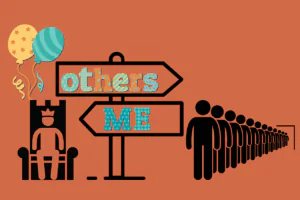Guest Blog post by Sarah Van Meter, LCSW
Originally published in September, 2021
I had a moment the other day that caused me to stop and ponder. One of my teen clients looked at me and said, “Sarah, come on. I’m Gen Z. We are nothing but depression and anxiety!” She started to laugh at her joke, as did I. After she left, I found myself alone with my thoughts, very aware that anxiety is an ever-growing concern amongst teens. Coping skills for teens with anxiety are needed more than ever.
The sad reality is that many teens (middle school and high school) are impacted by anxiety and that number is growing. In 2017 approximately one in three teens met the criteria to be diagnosed with generalized anxiety disorder by the time they turned 18. Now add in the impact of the Pandemic… Well, we can only assume the number is far higher than previously reported.
Teen Anxiety Symptoms
The two big questions that parents always have for men are “How do I know if my teen is anxious?” and “How do I help them?” Have no fear… I will answer both questions below.
But first, it is important to know that teens, like children, may not present symptoms of anxiety in the same manner that adults do. The human brain keeps developing well into your 20s. So that means teens do not have the same brain structure as adults.
The main symptom you can expect in a teen with anxiety is chronic worrying thoughts. They will become fixated on these thoughts and revisit them often. You will notice your teen wanting to discuss the same topic numerous times. Or they may start over-planning. Sometimes your anxious adolescent will want to keep revisiting expectations or plans they have.
When your teen is fixated or hyper focused on the worry thought, they may struggle to concentrate on other areas of their life. They may start to forget things they need to do for school. Or they may not hear you when they are told to complete certain tasks around the house.
They can become restless. One of my teen clients is known for pacing the room whenever she is anxious. Sometimes that means needing to walk during her sessions with me. Your teen may start to struggle with falling or staying asleep. It can be hard for you as a parent to know if sleep struggles are due to anxiety or because your teen is up late on social media or on YouTube.
There can be a change in your teen’s energy level. If all your teen’s energy is going toward thinking about the thing causing them anxiety or toward managing their anxiety, they will have little energy left to do homework or chores.
Your anxious adolescent may have somatic complaints. A somatic complaint is a physical symptom that is connected to their anxiety. Most common are headaches or stomach pains. But it could also be joint or muscle pain. More often than not, a doctor will be unable to diagnose what is causing the pain or complaint if it is an emotionally-based somatic complaint.
Lastly, your teen can become more irritable when they are anxious. They may snap at you, roll their eyes, talk back, or, as in my household, get extra sassy.
It is also important to note that your teen having one of these symptoms does not mean they have anxiety. When they have multiple symptoms, it is more likely that they have anxiety.
How to Treat and Build Coping Skills for Teenage Anxiety
Now… how to help your teen and build their anxiety coping skills. If you suspect your teenage child has anxiety, I recommend that you take your teen to see a mental health professional trained in working with children and adolescents. These professionals have the skills to work with teens and aid them with processing whatever is prompting the anxiety. The professional also helps your teen develop coping skills for anxiety, and they can help assess if an antianxiety medication might be needed.
However, if you are not feeling you are at the place of having your teen work with a professional, there are still things you can do to aid your teen. First and foremost, do not brush off their concerns! Let your teen talk out their concerns and empathize with their feelings. Then bring your adult brain to their aid. Help them to look for errors in their thoughts, help them to problem solve, and help them to explore the actual probability of their concerns occurring.
For example, I once had a teen client who was very anxious to play in a school sport’s half-time show. He had himself convinced that he would make a mistake and the WHOLE crowd would see it and start laughing at him. When I challenged him to consider how likely it was that he would make a mistake that the WHOLE crowd would see, the teen started to realize that it wasn’t very likely. He still wasn’t excited to play in the show, but his anxiety decreased significantly.
Related Reading: Back to School Anxiety
You can also help your anxious teen gain additional coping skills at home. There are numerous guided meditations, grounding skills, and mindfulness exercises available online. One favorite of my teens is what they call the RAINBOW. What they do is look around the room finding each color of the rainbow. They are so focused on finding the colors (especially since indigo is such a hard color to find) that by the time they are done their anxiety has declined.
Three Things Parents Can Do
If I boil it down, there are three big things that you can do to help with coping skills for teens with anxiety.
One is to be understanding. Teens are not growing up in the same world that you grew up in. There are new challenges. They are constantly being assaulted with social media, messages from others, or increased requirements from schools. Worries that were nonexistent to us are daily fodder on social media.
I am reminded daily of how “old” I am because I remember when texting first became a thing. It wasn’t that long ago, but to them it was a lifetime. Please do not view their anxieties or concerns as silly. There is a lot that this generation is facing that no other generation has had to face before.
Second is dealing with your teen’s phone. It is common for parents to ground teens from their phones as a consequence for bad behavior. However, when parents do that, they often unknowingly remove many of the coping skills their child is using. Teens often use music as a way to manage their moods and thoughts. All their music is on their phones. Albums, tapes, and CDs are a thing of the past. Many of their mindfulness skills, mood/anxiety trackers, and grounding skills are facilitated by apps on their phones.
Also, this generation, potentially more than others, leans very heavily on peer interactions. Many of them are expecting and providing support to their friends throughout the day. Yes, teens of previous generations found support through friends, but this generation even more so due to them having easier access to each other through the phone at their fingertips.
I am not saying don’t give your child a consequence or that you shouldn’t ever take their phone away. Just be aware of the impact removing their phone might have, and come up with a plan to help your child while they do not have those resources.
The third thing you can do is to watch your expectations of your child. When parents remind a teen that they have late assignments or that they got a poor grade on a test, it can amplify the anxiety the teen already feels.
Just last week I had a teen in my office in tears because she was struggling in a class, was overwhelmed, and her parents were reminding her daily of the assignments she was missing. She knew she was missing them. She had a plan to address it. The regular reminding only made the situation worse for her. Once again, I’m not saying you can’t remind your child or check on their progress. However, be careful of how and when you do it.
Above all, remember that your teen, whether they act like it or not, still need and want your help and support during this difficult time. If you are in northern Illinois and feel that therapy might provide you with teen anxiety help, please contact us at Life Care Wellness.
Sarah Van Meter works with all ages – children as young as 5 through older adults, and she specializes in working with at risk youth, youth in foster care, and those with complex trauma. Sarah utilizes Motivational Interviewing, Cognitive Behavioral Therapy (CBT), and Dialectic Behavioral Therapy (DBT). She has completed trainings in Trauma Focused Cognitive Behavioral Therapy (TF-CBT), Somatic Experiencing (SE), Health Coaching, and Fostering and Adoptive Concerns. Sarah also has advanced training in working with survivors of sexual assault, as well as Illinois Coalition Domestic Violence Professional certification. In addition to providing therapy, Sarah was part of the Long-Term Recovery Committee for the tornado that impacted Fairdale, Illinois, and she currently sits on the Trauma Informed Committee for the Mental Health Board of DeKalb County in northern Illinois.





